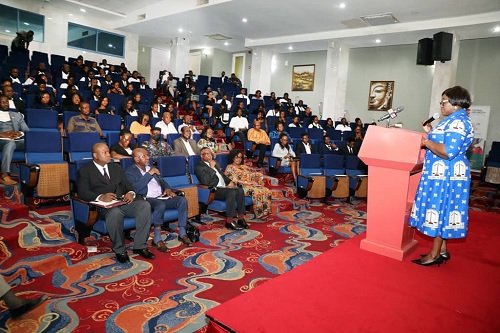
Land litigations affecting economic growth — Chief Justice
The Chief Justice, Justice Gertrude Sackey Torkornoo, has bemoaned the incessant challenges associated with land acquisition and administration, describing them as disincentives to investment and ultimately affecting economic growth.
Such challenges, she said, were often characterised by laborious land litigations, which unnecessarily prolonged business transactions, leading to increased costs and stifling investments.
“The effect of land litigation on the prosperity of the country cannot be underestimated. One can mortgage property or present it as collateral for credit but because of the extreme litigation space, interest rates are impacted,” she said.
Justice Torkornoo made the comments last Friday when she delivered a lecture on the topic: “The Sustainability of Excellent Legal Education in Tertiary Education in Ghana: The Way Forward”.
The lecture was part of the 10th anniversary celebrations of the Faculty of Law of the Central University (CU).
Customary law
Justice Torkornoo said customary law played a crucial role in land issues as it normally regulated ownership of lands, whether for families, clans or stools.
However, she said there was a lack of appreciation of the effect of customary law and the legal education in the country was also not giving it much prominence.
Such a situation, she added, was because the legal profession was confronted with customs on issues relating to land ownership, marriage, inheritance and many other aspects of Ghanaian society.
“The current gap in the legal study of customary law, the law on chieftaincy, the inter-sectionality of chieftaincy, land, ethnic governance, capital and asset management have weakened the proper growth of our society in ways that are almost immeasurable.
“For the nation to develop economic strength by genuinely empowering citizens, these gaps in legal education have to be tackled sooner than later, she stated.
Ethnic leadership
Again, the Chief Justice said there was a weak regulatory framework on ethnic leadership and how such authorities managed the assets placed under their care.
“Equally weak has been the nation’s due regulation of ethnic leadership and the proper devolution of power to manage family and stool assets – a situation that has often caused instability in the security and economic architecture of the nation,” the Chief Justice added.
Justice Torkornoo was also of the view that one mechanism that could help to quickly resolve land litigations and other disputes was alternative dispute resolution (ADR), adding that there was the need for law faculties to make ADR a core component of legal training.
“The art and skills of negotiation, mediation, arbitration and their different hybrid forms have been largely lost in the dispute resolution arena for commercial conflicts, land litigation, personal injury situations and other areas of conflict that unnecessarily dog the courts,” she said.
Legal education
The Chief Justice said legal education ought not to be taught in silos as pertained in other disciplines but in a practical manner that enabled students to appreciate the very nuances of law, other areas and their practicality in resolving societal problems.
For instance, she said, a trained lawyer working on a project contract must not just understand the law on contract but must also appreciate project management and its linkage with project value, and how other disciplines such as engineering and architecture impacted the contract under review.
In this regard, Justice Torkornoo said legal skills of analysis, evaluation and research should become part of legal education, and not be left for law students to learn after school.
“Legal apprenticeship must commence almost as early as the learning of philosophies, doctrines and principles.
A training content that is supplemented with training in research skills, brief writing, presentations, project and legal clinics work in an environment that ensures that as much serious attention is given to the learning of requisite legal skills as is given to the knowledge of the content,” the Chief Justice added.
Broadening horizon
The Vice Chancellor of the Central University, Prof. Bill Buenar Puplampu, said the public lecture was part of an initiative to broaden the horizon of students, explaining that “we are not only in the business of teaching but also sharing knowledge.”
Writer’s email: emma.hawkson@graphic.com.gh
